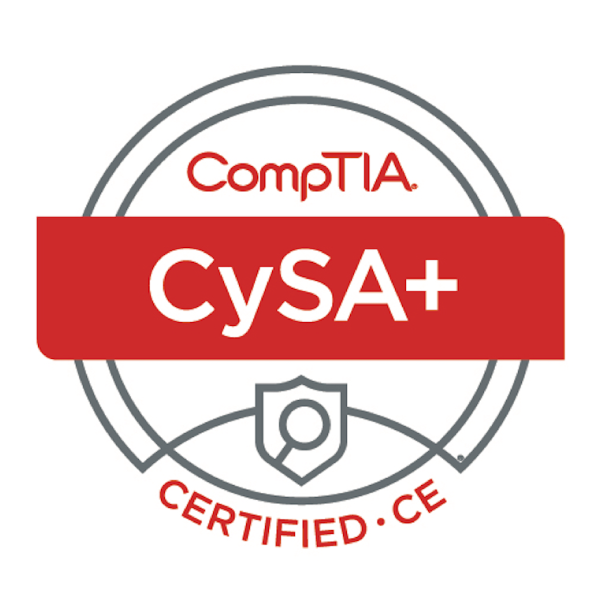CS0-003

| Formats: | Asynchronous |
| Blended | |
| Online | |
| Onsite | |
| Part-time | |
| Level: | Intermediate |
| Prerequisites: | |
| Recommended Knowledge | |
| 3-4 years of hands-on experience in information security or a related field | |
| CompTIA A+ | |
| CompTIA N+ | |
Formats: We offer our training content in a flexible format to suit your needs. Contact Us if you wish to know if we can accommodate your unique requirements.
Level: We are happy to customize course content to suit your skill level and learning goals. Contact us for a customized learning path.
CompTIA CySA+ (CS0-003)
The CompTIA Cybersecurity Analyst (CySA+) certification is an intermediate-level qualification that validates the skills required to proactively defend and improve the security of an organization by continuously monitoring, detecting, analyzing, and responding to cyber threats. The CySA+ certification proves you can function as a crucial link in a Security Operations Center (SOC) team, combining threat intelligence with practical security analysis to strengthen defenses and manage security incidents.
This course will teach you to:
- leverage intelligence & threat detection techniques,
- analyse & interpret data,
- identify & address vulnerabilities,
- respond and recover from security incidents,
- design preventative cybersecurity measures
Who Should Attend?
This course is designed for IT professionals seeking to specialize in cybersecurity analysis, threat detection, and incident response. The CompTIA CySA+ certification is ideal for:
- Security Analyst
- Threat Intelligence Analyst
- Security Operations Center (SOC) Analyst
- Application Security Analyst
- Vulnerability Management Analyst
- Compliance and Incident Response Analyst
- IT Security Professionals looking to validate intermediate-level analysis skills
CySA+ is aimed at those who move beyond defensive security (Security+) and into active threat analysis and management.
CySA+ Certification Career Opportunities
Achieving the CompTIA CySA+ opens doors to intermediate-level and high-demand analytical roles in the cybersecurity field, including:
- Cybersecurity Analyst
- Security Operations Center (SOC) Analyst
- Information Security Analyst
- Threat Hunter
- Vulnerability Analyst
- Incident Responder
- Forensics Analyst
CySA+ is a DoD 8570/8140 approved certification, making it a valuable credential for individuals seeking roles in government and defense sectors, in addition to finance, healthcare, and enterprise IT.
Course Prerequisites
CompTIA recommends, but does not strictly enforce, the following prerequisites for candidates pursuing the CySA+ certification:
- CompTIA Security+: Holding the Security+ certification or possessing equivalent knowledge is highly recommended.
- Networking Knowledge: Strong understanding of TCP/IP, networking ports, and protocols.
- Practical Experience: Having 3-4 years of hands-on experience in information security or a related field is beneficial.
- Linux Familiarity: Basic familiarity with the Linux operating system, as many security tools operate in this environment.
This course is designed for those who already have a foundational understanding of security concepts.
CompTIA CySA+ (CS0-003) Course Outline
Our updated and comprehensive CySA+ training covers the five domains required for the CS0-003 examination:
- Threat and Vulnerability Management
- Explain the importance of threat data and intelligence.
- Perform vulnerability management activities and analyze output from assessment tools.
- Explain threats and vulnerabilities in specialized technologies (e.g., IoT, cloud, containerization).
- Software and Systems Security
- Apply security solutions for infrastructure management (e.g., SIEM, firewalls, IDS).
- Explain software and hardware assurance best practices (e.g., secure coding, sandboxing).
- Security Operations and Monitoring
- Analyze data (e.g., logs, packets) as part of security monitoring activities.
- Explain the importance of proactive threat hunting and security automation.
- Implement configuration changes to existing controls to improve security posture.
- Incident Response
- Explain and apply the incident response process (e.g., preparation, detection, containment).
- Analyze potential indicators of compromise (IOCs) and utilize basic digital forensics techniques.
- Compliance and Assessment
- Understand the importance of data privacy, protection, and organizational risk mitigation.
- Explain the importance of frameworks, policies, procedures, and controls (e.g., NIST, ISO 27001).
Enroll Today
Our CompTIA CySA+ training is your opportunity to gain the critical, hands-on skills needed to excel as a cybersecurity analyst. With a focus on practical threat detection and incident response, you will be prepared to defend corporate networks and achieve a globally recognized, DoD-approved certification. Enroll today to take the next step in your cybersecurity career!